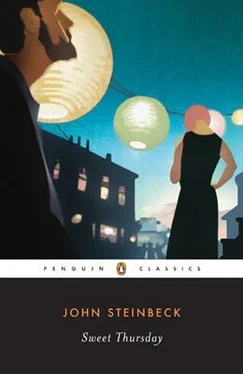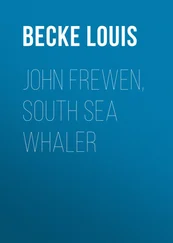John Steinbeck - Sweet Thursday
Здесь есть возможность читать онлайн «John Steinbeck - Sweet Thursday» весь текст электронной книги совершенно бесплатно (целиком полную версию без сокращений). В некоторых случаях можно слушать аудио, скачать через торрент в формате fb2 и присутствует краткое содержание. Год выпуска: 2008, ISBN: 2008, Издательство: Penguin Classics, Жанр: Классическая проза, на английском языке. Описание произведения, (предисловие) а так же отзывы посетителей доступны на портале библиотеки ЛибКат.
- Название:Sweet Thursday
- Автор:
- Издательство:Penguin Classics
- Жанр:
- Год:2008
- ISBN:1-4362-4126-X
- Рейтинг книги:5 / 5. Голосов: 1
-
Избранное:Добавить в избранное
- Отзывы:
-
Ваша оценка:
- 100
- 1
- 2
- 3
- 4
- 5
Sweet Thursday: краткое содержание, описание и аннотация
Предлагаем к чтению аннотацию, описание, краткое содержание или предисловие (зависит от того, что написал сам автор книги «Sweet Thursday»). Если вы не нашли необходимую информацию о книге — напишите в комментариях, мы постараемся отыскать её.
Cannery Row
Sweet Thursday — читать онлайн бесплатно полную книгу (весь текст) целиком
Ниже представлен текст книги, разбитый по страницам. Система сохранения места последней прочитанной страницы, позволяет с удобством читать онлайн бесплатно книгу «Sweet Thursday», без необходимости каждый раз заново искать на чём Вы остановились. Поставьте закладку, и сможете в любой момент перейти на страницу, на которой закончили чтение.
Интервал:
Закладка:
56
“lets concealment…his damask cheek”: Mack quoting Shakespeare is one of the incongruous comedic effects Steinbeck strove for in Sweet Thursday. Spoken by Viola in act II, scene 4, line 111 of William Shakespeare’s comedy Twelfth Night, or What You Will (ca. 1601–02):
“A blank, my lord. She never told her love,
But let concealment, like a worm i’ the bud,
Feed on her damask cheek: she pined in thought,
And with a green and yellow melancholy
She sat like patience on a monument,
Smiling at grief. Was not this love indeed?”
57
Lefty Grove: Robert Moses (Lefty) Grove, one of the greatest pitchers in major-league baseball history. Grove (1900–75) retired in 1941 with a career record of 300-141. His .680 lifetime winning percentage is eighth all-time, but none of the seven men ahead of him won more than 236 games. Grove was elected to the Baseball Hall of Fame in 1947. In 1999, he was elected to the Major League Baseball All-Century Team.
58
absinthe: A distilled, highly alcoholic, anise-flavored spirit derived from herbs including the flowers and leaves of the medicinal plant wormwood (Artemisia absinthium).
59
Woolworth’s: The F. W. Woolworth Company was a nationwide retail corporation whose five-and-dime stores became a nearly universal presence in America. The first Woolworth’s store was founded in 1878 by Frank Winfield Woolworth; the chain closed in 1997.
60
Flower in a Crannied Wall: “Flower in the Crannied Wall” (1869), by Alfred, Lord Tennyson (1809–92), a popular English Victorian poet and the poet laureate of En gland from 1850 to 1892: “Flower in the crannied wall, / I pluck you out of the crannies, / I hold you here, root and all, in my hand, / Little flower—but if I could understand / What you are, root and all, and all in all, / I should know what God and man is.”
61
Joe Elegant: Various candidates have been proposed as the model for Joe Elegant—notably mythologist Joseph Campbell and novelist Truman Capote—though, given the self-parodying nature of Sweet Thursday, Louis Owens, in John Steinbeck’s Re-Vision of America (1985), plausibly offers the “…young John Steinbeck, author of such ponderously mythical novels as Cup of Gold and To a God Unknown with their naive and heavy-handed wielding of symbols” (p. 194).
62
fusel oil: An oily, colorless liquid with a disagreeable odor and taste. It is a mixture of alcohols and fatty acids, formed during the alcoholic fermentation of organic materials. Fusel oil is used as a solvent in the manufacture of certain lacquers and enamels (it dissolves nitrocellulose). It is poisonous to humans.
63
Oakland Polytech: Oakland Technical High School, in Oakland, California, known locally as Oakland Tech, is a public high school located on 4351 Broadway in North Oakland. It is one of six comprehensive public high school campuses in Oakland. Founded in 1917, it is the alma mater of Clint Eastwood, Rickey Henderson, Huey P. Newton, and the Pointer Sisters.
64
Coca-Cola calendar girls: Illustrators for the Atlanta-based soft drink giant pioneered a type of graphically appealing and colorful calendar art that featured Coca-Cola’s Calendar Girls, who, though provocatively posed in bathing suits, were intended to portray wholesomeness as well as beauty. Steinbeck had used the ubiquitous advertising image in chapter one of The Wayward Bus (1947).
65
Romie Jacks: Romie Jack was one of the seven surviving children (out of nine) of wealthy and controversial Scottish-born Monterey County land baron David Jack and his wife, Maria Christina Soledad Romie. Romie served as manager of the family’s David Jack Corporation–owned Abbot Hotel (later Cominos Hotel) in Salinas. The Cominos Hotel is featured in Steinbeck’s short story “The Chrysanthemums.”
66
The Playing Fields of Harrow: Harrow School (founded in 1572), an exclusive, elite British men’s boarding (public) school near London, was famous for its tradition of Harrow football (begun in the nineteenth century), a unique hybrid game exclusive to the school, which combines elements of both soccer and rugby (but which uses a spherical-shaped leather ball). Because Fauna tutors her girls in social/sexual gamesmanship as a route to victory in matrimony, Steinbeck might also be alluding to a statement, allegedly by the Duke of Wellington, that “The Battle of Waterloo was won on the playing fields of Eton.”
67
Parcheesi: Brand name of a once-popular board game based on Pachisi, an ancient royal game of India created around 500 BCE, which utilized slave girls and concubines as red, yellow, blue, and green pawns on palace grounds. The trademark name was registered in 1870 by a New York game manufacturer.
68
high Elk: The Benevolent and Protective Order of Elks of the USA (B.P.O.E.), which began modestly in 1868 as a private drinking club to circumvent New York City laws governing the opening hours of public taverns, has evolved into a major American fraternal, charitable, and service order. Headquartered in Chicago, it has local lodges throughout the nation. Both Monterey and Salinas had active Elk Lodges.
69
haute monde: French for “fashionable society.”
70
A and P: The Great Atlantic and Pacific Tea Company, better known as A&P, is a North American supermarket chain. The company was founded in 1859 by George Huntington Hartford and George Gilman in Elmira, New York, as The Great American Tea Company. It was renamed “The Great Atlantic and Pacific Tea Company” in 1870, and over the next eighty years went on to become one of the dominant grocery chains in the United States.
71
Arbor Day: American holiday, first observed in 1872, that encourages the planting and care of trees. National Arbor Day is observed on the last Friday of April, but each state has its own date. California’s observation occurs March 7–14.
72
Watch and Ward: Steinbeck was both intrigued by and suspicious of civic, social, professional, or special-interest organizations, whether real (Woodmen of the World [128] Woodmen of the World: Widespread national fraternal organization founded in 1890 in Omaha, Nebraska, by Joseph Cullen Root. Lodges, whose members are eligible for a wide array of insurance coverage, conduct volunteer, patriotic, and charitable activities that benefit individuals and communities. The organization is one of the leading donors of U.S. flags to schools and nonprofit groups.
and I.O.O.F.) or imagined (Rattlesnake Club and Forward and Upward Club). In America and Americans (1966), he said, “Elks, Masons, Knight Templars, Woodmen of the World, Redmen, Eagles, Eastern Star, Foresters…the World Almanac lists hundreds of such societies and associations, military and religious, philosophic, scholarly, charitable, mystic, political, and some just plain nuts. All were and perhaps still are aristocratic and mostly secret and therefore exclusive. They seemed to fulfill a need for grandeur against a background of commonness, for aristocracy in the midst of democracy” (p. 360). His satire on civic hypocrisy is especially sharp here, for he refers to what was probably a local chapter of the New En gland Watch and Ward Society, founded in Boston in 1878 as the New En gland Society for the Suppression of Vice, and in 1890 renamed the Watch and Ward Society. It functioned as a watchdog agency against vice and led successful censorship campaigns against books it deemed obscene or pornographic.
Интервал:
Закладка:
Похожие книги на «Sweet Thursday»
Представляем Вашему вниманию похожие книги на «Sweet Thursday» списком для выбора. Мы отобрали схожую по названию и смыслу литературу в надежде предоставить читателям больше вариантов отыскать новые, интересные, ещё непрочитанные произведения.
Обсуждение, отзывы о книге «Sweet Thursday» и просто собственные мнения читателей. Оставьте ваши комментарии, напишите, что Вы думаете о произведении, его смысле или главных героях. Укажите что конкретно понравилось, а что нет, и почему Вы так считаете.










